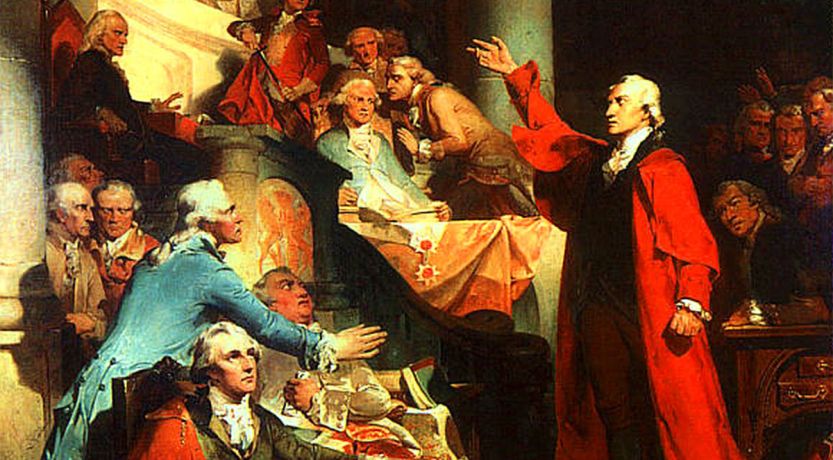.
What Are You Passionate About?
 “History and the Bible give us examples of zeal and passion. Are we passionate about the most important things? Or are we being distracted by other passions?
“History and the Bible give us examples of zeal and passion. Are we passionate about the most important things? Or are we being distracted by other passions?
What do you feel strongly about? What lights the fire in your soul and infuses you with focus and energy?
What are you really passionate about in your life?
Give me liberty…
An example of the kind of passion I’m talking about comes from U.S. history. In March of 1775 tensions between the American colonies and Great Britain were high. A man named Patrick Henry stood to address the Virginia legislature and share his view of the situation. It was apparently a rather impromptu speech about the need to separate from the British crown and form their own union—something about which Mr. Henry felt very strongly.
Perhaps you’ve never heard or read the entire thing, but I’ll almost guarantee that our American readers know the last seven words of his fiery and impassioned speech. As he brought his relatively short oration to its crescendo, he thundered out to the audience, “Give me liberty, or give me death!”
Patrick Henry was passionate about the founding of a new nation.
Some common passions
It seems human beings are hardwired to have strong feelings about certain things. Not everyone feels strongly about the same things or in the same way, and certainly not all of our passions are of the same magnitude as founding a new country!
But there are still a lot of different things that fire up the imaginations and passions of people.

A few things people are commonly quite passionate about are fashion, art, music, health and fitness, hobbies, technology, sports and sports teams, hunting and fishing (or anti-hunting and maybe anti-fishing), animal rights and more.
Oddly enough, a few days ago I was talking with someone who was very passionate about animal rights, specifically opossum rights. … Okay, I’ve got to admit that was a new one for me.
On a more somber note, today there are a lot of people who are passionate and even violent about some prickly social issues. And many are very passionate about the political positions and platforms that are intractably connected to all those social issues.
That’s a lot of passion, a lot of emotion! And the chances are very good that you are passionate about some issues too.
So maybe the more important question is: Are you passionate about the right things?
Are you passionate about the right things?
While there is nothing wrong with strong feelings about sports, art, animals or other endeavors in life, there are some things that are more important and that deserve more of our attention than others.
Are we overlooking something infinitely more important that most people miss, yet that we should be passionate about?
“Zeal for Your house”
In the Bible we read an account of when Jesus Christ went up to the temple. He saw people who were doing business, changing money, selling animals to be sacrificed and so forth.
Not only were they doing business on holy ground, but very likely they weren’t being honest and were taking advantage of those who came to the temple to worship and offer sacrifices.
We read in John 2:15-16 that Jesus made a whip of rope, flipped over the money changers’ tables and with zeal drove them all out of the temple! In verse 17 it says, “Then His disciples remembered that it was written, ‘Zeal for Your house has eaten Me up.’” The English Standard Version puts it, “Zeal for your house will consume me.”
Jesus loved people. He was compassionate toward those who were hurting and in need of healing and comfort, and He taught them continually the things that would really make a difference in their lives. He had a passion for people and for serving.
But He was most passionate about the things of God—the standards, values and principles of the great Creator God!
John Gill’s commentary on the Bible points out that Christ’s regard for His Father’s house “was typical of the church of God; and such his concern for his honour, ordinances, and worship, that when he saw the merchandise that was carried on in the temple, his zeal, which was a true and hearty affection for God, … was stirred up in him, and to such a degree that it was like a consuming fire.”
Have we chosen to be passionate about what is really the most important?
The standards, values and principles of God stand in stark contrast to those of this present world, which is focused on self-serving interests, immorality and blatant sinfulness. In fact, it is the Kingdom He will bring when He returns that is the only hope for mankind—and He is immensely passionate for that Kingdom!
What about us? How passionate are we for the standards, values and principles of God? Have we chosen to be passionate about what is really the most important?
Enthusiastic about doing good things
Consider the words of the apostle Paul in Titus 2:11-14, as it is translated in God’s Word translation:
“After all, God’s saving kindness has appeared for the benefit of all people. It trains us to avoid ungodly lives filled with worldly desires so that we can live self-controlled, moral, and godly lives in this present world.
“At the same time we can expect what we hope for—the appearance of the glory of our great God and Savior, Jesus Christ. He gave himself for us to set us free from every sin and to cleanse us so that we can be his special people who are enthusiastic about doing good things.”
Battling distractions
Most of us want to have that passion, that zeal, that “fire in the belly” for the things of God. But with all the distractions swirling around us, with all the challenges and turmoil in the world, it can be easy for us to lose our focus and allow our greatest level of passion to be given to something else.
We need to make sure we are firmly connected to the Word of God. We must read and study it daily. With prayer and periodic fasting, we should ask God for the passion we need to have as His people. And we can ask Him for the guidance we need to negotiate these challenging times.
If we are immersed in the Word of God, it is harder for other issues to steal all our time and energy!
I am sure we are all passionate about various things. But are we right now passionate about the most important thing? Do we have a Patrick Henry–level of passion for a new Kingdom, the Kingdom of God?” From: https://lifehopeandtruth.com/life/christian-living/what-are-you-passionate-about/
Learn more in our article “Seek First the Kingdom of God.””
_______
Halloween's Dark Roots
“In recent years eye-opening materials have been published about the questionable background of Halloween.
In recent years eye-opening materials have been published about the questionable background of Halloween. Consider these excerpts:
"Halloween-a holiday that mixes generic religious beliefs with ancient folk customs-is supposed to be fun. But for many conservative Christians, it has become a dark and spiritually dangerous celebration ... Many are boycotting the bats, witches, goblins and ghouls that symbolize the holiday because they consider such things to be lures in the satanic struggle for human souls ...
"Halloween's pagan roots are real, as are those of Christmas and Easter. Santa Claus comes from an ancient woodland spirit honored by pagans, and Easter's non-Christian ancestry is derived from a Germanic fertility goddess, thus the Easter eggs and Easter bunny ... Halloween was called samhain in the pagan world-part harvest festival, partly a day to honor the dead" (Knight-Ridder/Tribune News Service, Oct. 28, 1993, "Conservative Christians Urge Halloween Alternative").
"The ancient Celtic [Irish, Scottish, Welsh] festival called Samhain is considered by many to be a predecessor of our contemporary Halloween. Samhain was the New Year's Day of the Celts, celebrated on 1 November. It was also a day of the dead, a time when it was believed that the souls of those who had died during the year were allowed access to the land of the dead. It was related to the season: by Samhain, the crops should be harvested and the animals brought in from the distant fields.
"Many traditional beliefs and customs associated with Samhain, most notable that night was the time of the wandering dead, the practice of leaving offerings of food and drink to masked and costumed revelers, and the lighting of bonfires, continued to be practiced on 31 October, known as the Eve of All Saints, the Eve of All Hallows, or Hallow Even. It is the glossing of the name Hallow Even that has given us the name Hallowe'en.
"... The customs associated with Halloween included representations of ghosts and human skeletons-symbols of the dead-and of the devil and other malevolent, evil creatures, such as witches.
"The first week of November is marked in many countries, especially those with a strong Catholic influence, with festivals concerned with death, in a playful but serious way. In Catholic countries we often find some cognate of Halloween associated with All Saints' or All Souls' days.
"... Unlike the American Halloween, in Mexico people build home altars, adorned with religious icons and special breads and other food for the dead. The Day of the Dead incorporates recognition of death as a concept with rituals that remember the deaths of individuals" (Jack Santino, Halloween and Other Festivals of Death and Life, 1994). GN” From: https://www.ucg.org/the-good-news/halloweens-dark-roots
_______
![]() (5) Examine yourselves as to whether you are in the faith. Test yourselves. Do you not know yourselves, that Jesus Christ is in you?—unless indeed you are disqualified.
(5) Examine yourselves as to whether you are in the faith. Test yourselves. Do you not know yourselves, that Jesus Christ is in you?—unless indeed you are disqualified.
- New King James Version
![]() Unless indeed you are disqualified - Disqualified ("reprobates" in the King James Version, Strong's #1384: adókimos) means, according to Vine's, "not standing the test, rejected." It suggests "unacceptable," "disapproved," "unworthy," "spurious," "worthless," "cast away." This word's meaning is illustrated by the following verses:
Unless indeed you are disqualified - Disqualified ("reprobates" in the King James Version, Strong's #1384: adókimos) means, according to Vine's, "not standing the test, rejected." It suggests "unacceptable," "disapproved," "unworthy," "spurious," "worthless," "cast away." This word's meaning is illustrated by the following verses:
Romans 1:28: And even as they did not like to retain God in their knowledge, God gave them over to a debased [adókimon] mind, to do those things which are not fitting.
Titus 1:16: They profess to know God, but in works they deny Him, being abominable, disobedient, and disqualified [adókimoi] for every good work.
Hebrews 6:7-8: For the earth which drinks in the rain that often comes upon it, and bears herbs useful for those by whom it is cultivated, receives blessing from God; but if it bears thorns and briars, it is rejected [adókimos] and near to being cursed, whose end is to be burned.
Being disqualified or rejected is the opposite of having Jesus Christ dwell in us; it is being unfit or unworthy of His presence in us. In other words, a disqualified person is cut off from God! This is the worst possible outcome of a Christian's life: to return to a life of sin and have so much pride that he or she rejects salvation and all that comes with it! God's Word clearly shows that it can happen (see Hebrews 6:4-6; 10:26-31)!
Regular self-examination is a proven way to make sure that it does not happen to us!” From: https://www.theberean.org/index.cfm/main/default/id/6797/ver/NKJV/2-corinthians-13-5.htm To learn more, see: What Does 'Examine Yourselves' Mean?
_______
How to Fight Against Cancer | 12 Anti-Angiogenic Foods
The Biblical Nutritionist 152K subscribers
“My mom was diagnosed with cancer and the Doctors said there was nothing they could do. Here’s how we fought cancer and gave her 19 more years of adventure and travel with 12 anti-angiogenic foods!
Cancer touches so many lives, in this video, I share with you my personal story dealing with cancer. Don’t lose hope. I’m on mission to keep you on mission! I want you to be confident in the kitchen so you can feel confident, understand how your body works and understand how much God loves you!” YouTube: https://youtu.be/DxKCZ5UvPhI
Also, Watch my video on the importance of Routine Blood Work: https://www.youtube.com/watch?v=dCRiP...
______














No comments:
Post a Comment